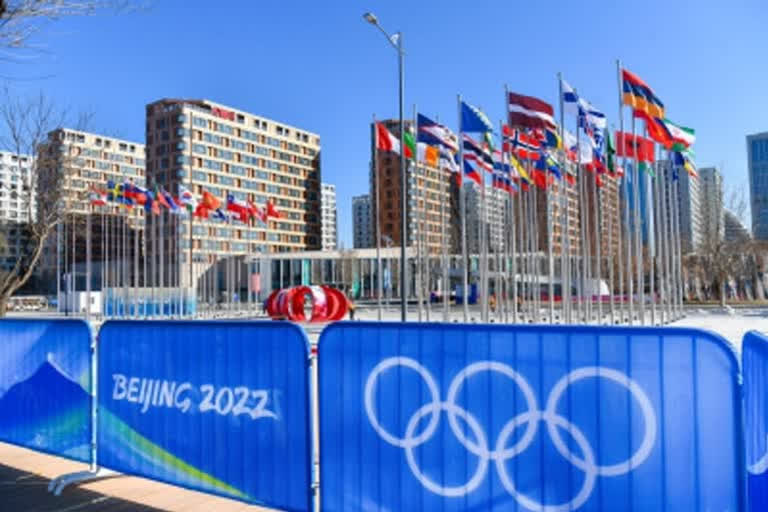New Delhi: Russian President Vladimir Putin and his Chinese counterpart President Xi Jinping reiterated their “strong mutual support for the safeguarding of principal interests including state sovereignty, territorial integrity, and their resistance to foreign involvement in their domestic affairs, in a veiled attack against the United States of America”.
In a joint statement on the eve of the Beijing Winter Olympics, both the sides while denouncing the “actions of a few states”, reaffirmed their “mutual support for establishing democracy around the globe but without indulging in the affairs of others states”, in an indirect reference to their principal challenger, the United States of America.
The statement said that both Russia and China “intend to counter interference by outside forces in the internal affairs of sovereign countries under any pretext, oppose color revolutions and will increase cooperation in the aforementioned areas”. As Moscow suffers huge flak from the West for its deployment of more than 100,000 troops around Ukraine's border which has reinvigorated the idea of Cold War 2.0, the joint statement did not mention a word about Ukraine.
As per the analysts, Beijing has been Moscow's principal ally for the past few years and especially after Russia annexed the Crimean peninsula in 2014 forcing them to tilt their side even more to Beijing after facing huge economic sanctions from the US, Bejing would not want Moscow to invade Ukraine. Though the row over the Ukraine crisis has the potential to reorganize the World Order the Chinese have sided with Russia for their demand that NATO should not expand its influence into the eastern European states which were a part of the Soviet Union before its collapse in 1991.
The joint statement also highlighted that China explicitly backs Russia to “oppose further enlargement of NATO,” and furthermore echoed Putin’s earlier demands for “long-term legally binding security guarantees in Europe.”
Criticizing the US for its military expansion in the Indo-Pacific and through AUKUS, the joint statement said "The sides are seriously concerned about the trilateral security partnership between Australia, the United States, and the United Kingdom (AUKUS), which provides for deeper cooperation between its members in areas involving strategic stability, in particular their decision to initiate cooperation in the field of nuclear-powered submarines." "Russia and China believe that such actions are contrary to the objectives of security and sustainable development of the Asia-Pacific region, increase the danger of an arms race in the region, and pose serious risks of nuclear proliferation. The sides strongly condemn such moves and call on AUKUS participants to fulfill their nuclear and missile non-proliferation commitments in good faith and to work together to safeguard peace, stability, and development in the region", the statement added.
In a direct reference to the One-China Policy, Moscow reiterates that 'Taiwan is an inalienable part of China and rejects the island's independence in any form.
"The Russian side reaffirms its support for the One-China principle, confirms that Taiwan is an inalienable part of China, and opposes any forms of independence of Taiwan," the statement read. The document also criticized Japan for release of nuclear-contaminated water from the Fukushima nuclear plant into the ocean and emphasized that "the disposal of nuclear contaminated water should be handled with responsibility and carried out in a proper manner based on arrangements between the Japanese side and neighboring States, other interested parties, and relevant international agencies while ensuring transparency, scientific reasoning, and in accordance with international law."
In a repeated reference to the criticism from the West over the lack of political freedom in both Russia and China, the statement read "It is only up to the people of the country to decide whether their State is a democratic one". Highlighting the significance of the Eurasian Economic Union and China's flagship Belt and Road initiative (BRI) project, both sides seek to advance their work to link the development plans for the Eurasian Economic Union and the Belt and Road Initiative with a view to intensifying practical cooperation between the EAEU and China in various areas and promoting greater interconnectedness between the Asia Pacific and Eurasian regions. "The sides reaffirm their focus on building the Greater Eurasian Partnership in parallel and in coordination with the Belt and Road construction to foster the development of regional associations as well as bilateral and multilateral integration processes for the benefit of the peoples on the Eurasian continent," the statement said.
The Russian side also welcomes the work carried out jointly by China and WHO to identify the source of the new coronavirus infection and supports the China – WHO joint report on the matter, a delicate topic for Beijing.
Also Read: Putin-Jinping bonhomie at Beijing Olympics, suggests shift from QUAD to AUKUS, says expert



